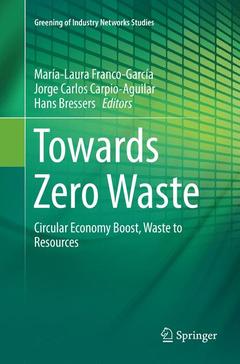Description
Towards Zero Waste, Softcover reprint of the original 1st ed. 2019
Circular Economy Boost, Waste to Resources
Greening of Industry Networks Studies Series, Vol. 6
Language: English
Subjects for Towards Zero Waste:
Publication date: 01-2019
Support: Print on demand
Publication date: 09-2018
Support: Print on demand
Description
/li>Contents
/li>Biography
/li>Comment
/li>
This book draws on insights that originated from the Circular Economy and Zero Waste initiatives. Together these approaches try to boost the shift from ?waste? to ?resources? management. The content of this book is partially organized from a stakeholder perspective, revealing the managerial implications for public and private actors. Next to public policies, also illustrations come from the private sector. Petstar, Texperium and Walmart generously shared some of their best practices at in this regard.
Cases from China, Indonesia, Mexico, the Netherlands and Romania are discussed in this book. In all of these different contexts they show ways to create collaborative schemes in order to ?retain? the resources? values as much as product quality and financial circumstances permit.
The reader can thus take advantage of the pragmatic viewpoints that aim to inspire policy makers, researchers, students, organisations and communities to boost the needed changes towards a Zero Waste Economy.
Franco-García lectured and researched at “National Autonomous University of Mexico (UNAM)”, “Metropolitan Autonomous University” and “Tecnológico de Monterrey”. These represent some of the most recognised high educational institutions in Mexico. In 2003 she became director of the first Master’s programme on “Sustainable Development Sciences” and she was head of the “Sustainable Development” department” at Tecnológico de Monterrey, Campus Mexico State, till 2006. She currently teaches in the Masters of Energy and Environmental Management (MEEM) and the programme (at bachelor level): “Crossing borders, international grand challenges and strategies for technology, sustainability and development”.
Franco-García is one of the European coordinators of the global network of “Greening of Industry Network (GIN)”,GIN organizes conferences in three regions so far: Asia, America and Europa. The latest one (May 2017) was dedicated to topics associated to the SDG and Sustainable Supply Chains in the post-global economy.
MSc. Jorge-Carlos Carpio Aguilar (1987), Professor of Climate Change & Energy Use at “Tecnológico de Monterrey” in Mexico and Sustainability Manager at Walmart Mexico & Central America. From his role in the private initiative, he has been leading sustainability projects along the supply chain, also considering the interaction with the public sector. He is currently responsible of the 2025 strategy for the zero landfill objective based on Circular Economy principles for Walmart Mexico. Jorge is also a technical expert and member of the Sustainability Committee of the Mexican Accreditation Entity (EMA).
He holds an Industrial and Systems Engineer degree and a Master’s of Science in Sustainable Development from “Tecnológico de Monterrey” in Mexico. Jorge also has experience in the mass consumer goods, recycling and packaging industries, where he was leading the development of a route map strategy to achieve sustainability goals for
Provides practical examples of circular economy implementation adopted and adapted to their contextual situation
Describes challenges from the practitioners' perspective enriching the literature on this field
Presents different theoretical frameworks
Explains the motivations and pressures of circular economy promoters to collaborate for improving the resources management at municipal or industrial level, often in a context of national priorities




